English
Changes of tenant's law in Poland
Yak, Nie, 2010-01-03 10:39 EnglishThe Polish ministry of economy is sponsoring changes in the so-called law for protection of tenants.
Currently, a private or state owner of a house has to provide replacement housing when evicting tenants. Very often the replacement is very shabby and the state bureaucrats don't respect this regulation anyway by refusing housing on dubious grounds. For example, in one case in a district of Warsaw, the local administration told tenants of a house that is about to collapse that they will not provide them replacement housing, because "they can live with their parents". This is a middle-aged family with 2 kids.
Apparently the regulations that are not respected anyway were too annoying for the owners and public administration lobby.
Invitation to the “Libertarian communism 2010” forum in Moscow
Yak, Sob, 2010-01-02 11:21 EnglishInvitation to the “Libertarian communism 2010” forum in Moscow from the 6th to the 8th of March 2010
From time to time, we should meet to discuss perspectives of our movement in the framework of global capitalism, evaluate successes and failures of our fight and plan new struggles. For this purpose, we invite you to the “Libertarian communism 2010” forum to be organised in Moscow.
Russia: Support for January 19 Demonstration
Akai47, Pią, 2010-01-01 16:01 English On January 19 there will be a demonstration in Moscow against far-right terror. This is news now that the demo will be supported and attended even by very well-known people including the writer Boris Strugatski, filmakers Aleksander Rodionov and Boris Khlebnikov, musician Andrei Makarevich, artist Vladimir Dubossarski in addition to famous human rights activists and even including famous dissident priest Gleb Yakunin.
On January 19 there will be a demonstration in Moscow against far-right terror. This is news now that the demo will be supported and attended even by very well-known people including the writer Boris Strugatski, filmakers Aleksander Rodionov and Boris Khlebnikov, musician Andrei Makarevich, artist Vladimir Dubossarski in addition to famous human rights activists and even including famous dissident priest Gleb Yakunin.
http://jan-19.livejournal.com/1782.html
http://19jan.ru/aktsiyu-podderzhivayut
Amadeu Casellas announces new hunger strike
Czytelnik CIA, Śro, 2009-12-30 07:43 English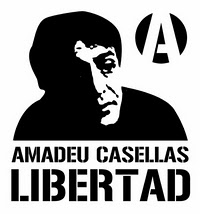 Communiqué:
Communiqué:
Ever since the socialists of the PSC took charge of Catalan prisons, deaths have multiplied, especially during the last three years under Montserrat Tura’s leadership. In Brians 2 prison alone, which opened two years ago, there have been more than 30 deaths. If we take into account that there are 11 prisons in Catalunya, without counting the deaths that occurred in Terrassa Prison Hospital due to incurable disease, how many deaths have there been? Where is the dignity for these sick prisoners who die alone in a prison hospital? Where are the humanitarian motives?
Among the deaths due to overdose or hanging, most are suicides caused by trickery, lies, and the separation of prisoners from their loved ones as a form of secret reprisal or punishment—a sad record for a government that considers itself leftist and socialist. I suppose Montserrat Tura, Councilor of Justice, is proud of exterminating people from working families. The strange thing is that, among so many dead, I know of none who were rich, politicians, police, or businessmen. But of course, how can I be so dense? Such people are not in prison, and when they are here for a brief stay, they are treated with velvet gloves. Certainly not! Right, Montserrat Tura? I imagine that for you it’s a pity I am not among the many dead—nor will I be, at least not from overdose or hanging. If I die, it will be from one of those long hunger strikes I am forced to go on as a result of the captivity that I and other comrades are enduring. But now you see that your lies can’t break me. I am not giving up, and you know it. On January 20, I will begin another long hunger strike, and this one will last until I die or am set free. [emphasis added] As you can see, there are more people outside these walls who are with me each time—people who aren’t anarchists like me, because we anarchists, as you already know, don’t yield to authoritarian fascists like you. The people to whom I am referring are the ones who go to the voting booths, and they will surely know that a vote for the PSC in the next Catalan election is the same as a vote for the PP. Therefore, I hope they send you where you belong: the Catalan sewers. The struggle continues, Montserrat Tura. Don’t you forget it.
- Amadeu Casellas Ramón, Girona, 1-12-2009
Manifesto of the January 19 Committee, Moscow
Akai47, Śro, 2009-12-23 23:37 EnglishOn January 19, 2010, a year to the day from the murders of Stanislav Markelov and Anastasia Baburova, we, the organizers of an antifascist march, call on you to join our campaign against neo-Nazi terrorism.
The word fascism has been utterly devalued today. It is hard to find a political movement that avoids branding its opponents as “fascists.” But there are also meaningful interpretations of this term. Many of them have a direct bearing on what is taking place in contemporary Russia.
For some people, fascism is the extreme intolerance intrinsic to authoritarian societies. For others, it is an ideology of exploitation and coercion. For still others, it means the use by the authorities of covert paramilitary units for the suppression of democratic movements. Finally, for some, fascism is a force that murders good people, people like the lawyer Stanislav Markelov and the journalist Nastya Baburova, the young antifascists Fyodor Filatov and Ivan Khutorskoi, the
ethnologist Nikolai Girenko, the chess player Sergei Nikolaev from Yakutia, the programmer Bair Sambuev from Buryatia, and hundreds of others. People who define fascism in this way do not divide their enemies into Russians and non-Russians, grown-ups and children, priests and punk rock fans, young activists and defenseless janitors from Central Asia.
English Translation of Book on Anarchosyndicalism Recommended
Akai47, Śro, 2009-12-23 00:23 English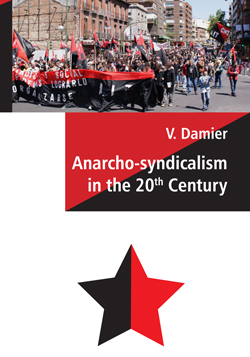 We recommend this book!
We recommend this book!
Anarcho-syndicalism in the 20th Century—A new book from Black Cat Press
We are happy to announce another new book from Black Cat Press. Anarcho-syndicalism in the 20th Century, translated by Malcolm Archibald, is now in stock. It’s heartening to see Vadim Damier’s book available to English-language readers. Recent titles, especially those utilizing so many archival sources, are expanding our understanding of the global anarchist movement.
We welcome the opportunity to reflect on the recent history of a movement that is often dubbed moribund, outmoded, or otherwise useless. What’s perhaps strangest about the blanket rejection of the syndicalist tradition is that it is often done with such ignorance. Hopefully resources like this one by Damier will change the perceptions of some contemporary anarchists toward the anarcho-syndicalist legacy. Although, more importantly, may the book embolden those drawing lessons from the global anarchist tradition to apply them in the here and now, under present circumstances.
Here’s an excerpt:
Demonstration for the Freedom to Unionize a Success
Czytelnik CIA, Pon, 2009-12-21 11:00 English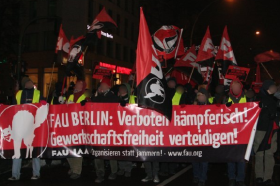 300 people demonstrated against the court decision prohibiting the FAU Berlin from calling itself a union.
300 people demonstrated against the court decision prohibiting the FAU Berlin from calling itself a union.
Despite freezing cold temperatures and the short mobilization period, the large crowd of demonstrators showed that they weren't going to take the de facto ban of the FAU Berlin lying down. The demonstration headed towards the Babylon Mitte cinema, whose managers had obtained the ban from the Berlin Regional Court on the December 11, 2009. For this and other attempts to stamp out workers' rights, Babylon manager Timothy Grossman was presented in absentia with the Margaret Thatcher Award for 2009 during the demonstration.
The central theme of the various speeches was the regional court's scandalous decision, which is in flagrant disregard of the basic right to organize. Also discussed was the roll of ver.di (a big union in Germany) and the Left Party (part of Berlin's ruling coalition), who together with the cinema's management undermined the workers' struggle. A few days earlier, ver.di - at the behest of the Left Party - signed a labor contract with the management, which was negotiated without the employees' input and involves conditions well below ver.di's own master contract with other cinemas.
In his speech Hansi Oostinga of the FAU Berlin said: "Our month-long struggle at the Babylon cinema has shown that self-organized, grassroots resistance is possible and can be successful, but also that all attempts will be made to stamp it out. A good union is one that the boss doesn't like."
Photos of the demo
For more information about the ban or to send a protest letter, see:
www.fau.zsp.net.pl
Chechens Under Arrest
Akai47, Nie, 2009-12-20 14:43 EnglishA few days ago we wrote about a group of Chechen refugees which blocked the rail border with Germany. The refugees claimed they were going to Strasburg to complain about the conditions in the refugee centers in Poland and the fact that they are rarely given refugee status. (Usually they are considered "tolerated people" which mean that they don't have to leave Poland, but they also cannot work.)
Over 230 people were in the group. They were brought by the border guards to the station in Zgorzelec. 38 of the people detained did not have proper papers and were arrested for deportation. Another 33 people - Chechens and Georgians - are being held in arrest since the police police they are a flight risk and will try again to cross the border.
Vetelca: The story of the first ever Bolivarian maquila factory
El Libertario, Sob, 2009-12-19 23:19 English | Represje | Tacy są politycy | Technika* This report originally appears in issue #57 of Venezuelan anarchist newspaper El Libertario www.nodo50.org/ellibertario [website in Spanish, English & other languages]. It is a detailed examination of the events behind the mobile telephone manufacturer Vetelca, in which the notion of a socialist industrial production model in Venezuela is unmasked.
On 10th May, 2009, President Hugo Chávez appeared on national television from the El Tigre region of Barinas state in order to announce to the nation the availability of a mobile telephone made under the supervision of the Bolivarian government. Some weeks earlier, he himself had named it «El Vergatario» [a crude term which roughly translates as “the biggest dick” - translator]. Rather typically for those familiar with chavista propaganda methods, the unveiling of this product - supposedly symbolising yet another step forward for his political project - coincided with the traditional Venezuelan national holiday for Mothers’ Day.
The Anarchist School: Education For Equality
El Libertario, Sob, 2009-12-19 23:17 Edukacja/Prawa dziecka | English | Kultura | Ruch anarchistyczny* The following text, published in # 57 of El Libertario, Venezuela, condenses the vision of the theme of the author, who died in the middle of 2009, who thanks to the work developed in her Free School Paideia, in Mérida, Spain, was a contemporary exponent recognized for the practice and the theory of libertarian education.
[After more than 25 years of intense pedagogical work since a libertarian vision, the last 1st of July Josefa Martín Luengo passed away (1945-2009), she was hostess of the School Free Paideia www.paideiaescuelalibre.org, located in Mérida – Spain, participant of the collective Women of Anarchy –Mujeres por la Anarquía- and close to the National Confederation of Work –Confederación Nacional del Trabajo CNT-. “Pepita,” as we lovingly called her companions, on various occasions she had praised the work of El Libertario, and for our 40th edition, a special anniversary number, she remitted to us two articles to be published, of which we had to keep one in file due to limitations of space. As homage, we publish a summarized version of that second text, which can be discharged integrally in www.nodo50.org/ellibertario.]
Tenants' Bonfires and Protests. Local Residents Demand Heat, Repairs and Confront Yuppie Artists.
Akai47, Śro, 2009-12-16 23:43 English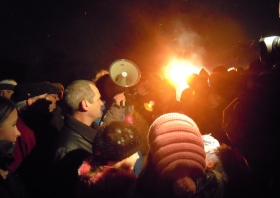 Today in Warsaw's Praga district there was a first: a protest which turned into a mass confrontation of local residents with yuppie scum / artists.
Today in Warsaw's Praga district there was a first: a protest which turned into a mass confrontation of local residents with yuppie scum / artists.
For a bit of background: last week tenants protested in Warsaw, burning the legislation and declaring war on the city. In particular, the Tenants' Defense Committee has been fighting against the city budget since money which was intended for housing repairs was not included in the draft budget and was allocated for other purposes - namely for politicians' salaries and perks. At the same time, the Committee has decided to hold bonfires around the city as a way of getting people out of their houses and networking. Besides the fun of the fires, the Committee would like to draw attention to something else: that many residents of the Praga district do not have heat in their houses.
Gaidar Dead, Balcerowicz Back to Life
Akai47, Śro, 2009-12-16 23:07 EnglishYegor Gaidar, the doctor of shock therapy, is DEAD. Gaidar helped create Russia's shock reforms in the early 90s and also was involved in the thieving privatization schemes which eventually created the rule of the oligarchs.
One bloody shock therapist down. But on the anniversary of Poland's introduction of economic reforms, Leszek "the Vampire" Balcerowicz is back, complaining that the Tatcherite bastards in government are simply not hard enough. According to Lesz the Vampire, we should put up the retirement age, which he refers to as "no big sacrifice". He also claims that we need to speed up the privatization of everything and that there is no reason to create jobs in "Poland B". (Poland B refers to smaller cities in Poland.)
Finally, Balcerowicz criticizes the "myth" that there need to be collective agreements and wants to get rid of unions. The one thing he says about unions that we agree with is that there are some interest groups which you cannot come to an agreement with. (Of course by this he means that capitalists cannot agree with.)
Chechen Refugees Protest, Block Border with Germany
Akai47, Wto, 2009-12-15 22:33 English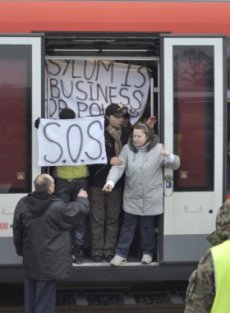 A group of over 230 Chechem immigrants blocked the railway border in Zgorzelec today. They were trying to travel to Strasbourg where they wanted to complain about the conditions at refugee centers in Poland.
A group of over 230 Chechem immigrants blocked the railway border in Zgorzelec today. They were trying to travel to Strasbourg where they wanted to complain about the conditions at refugee centers in Poland.
The train was first stopped in the city of Legnica, still far from the border, where the passengers were controlled. After about one hour, the train went further but was again stopped in Zgorzelec. The passengers were told they could not travel further.
The immigrants made an action at the border, blocking the railway tracks. After some time they were all detained by the border police.
The action comes a day after the Polish press starting publishing articles on how Poland is the "best country in Europe for refugees". These articles are based on the misleading information published by Eurostat on Dec. 8 which claims that Poland accepts 65% of refugees. In fact, the Eurostat statistics include 3 different types of status. In Poland, the great majority of refugees do not receive asylum but are also not deported. Those who do not receive official status are not allowed. among other things, to work and are basically confined to life in refugee centers where conditions are impossible. The publication of highly misleading information by Eurostat hit the refugees hard as their situation in Poland is dire, but the Eurostat statistics allow the government to claim that there is no problem and, as the press claims, that this country is a "paradise" for refugees.
CALL OUT-ACT IN SOLIDARITY, SUPPORT CPH ACTIVISTS
Griks, Pon, 2009-12-14 21:42 EnglishCALL OUT FOR INTERNATIONAL SOLIDARITY
TAKE ACTION IN SUPPORT OF THE ACTIVISTS IN COPENHAGEN FACING A POLICE STATE ON WEDNESDAY!
Free all the climate justice Prisoners in Copenhagen!
Stop police states and repressive capitalist summits!
For our autonomy on the streets!
Take simultaneous actions everywhere on WEDNESDAY 16th December.
During the 'Global Day of Action' in Copenhagen on Saturday -were up to 100,000 climate justice activists were protesting against the failed UN climate summit- Danish police indiscriminately made a mass arrests of 968 activists. They have expressed severe physical discomfort and have no access to water, medical attention or toilet facilities. Many are reported to have urinated themselves while detained on the ground.
CNT-Madrid Interviews members of Slovenian Anarchist Federation abont the Belgrade Six
Czytelnik CIA, Pon, 2009-12-14 19:50 EnglishOn Sunday, November 23 some comrades from the Metal Union and the Union for Various Services of the CNT-Madrid interviewed a member of the Federacija za Anarhistic(no Organiziranje (FAO), an anarchist federation of Slovenia. We were expectant to do this interview, as the comrade of the FAO maintains in regular contact with members of the Anarho-sindikalistic(ka Inicijativa (ASI).
---- What is your relationship with the ASI? Are you in contact?
---- I am a member of the anarchist federation of Slovenia (“Federation
for Anarchist Organizing”). For more than eight years we maintain a close relationship with fellow anarco-syndicalists of the ASI and the two organizations have been collaborating together in activities whenever it’s been possible.
We are currently in contact with some members of the ASI but the communication is more then difficult because they are being closely monitored by the Serbian state. However, neither we nor the members of the ASI have direct contact with the prisoners.
- What is the situation right now with the comrades? Are you optimistic?
On the contrary, I’m very pessimistic. As you can imagine, the situation is very
frustrating for everyone, especially due to the fact that the Serbian state is absolutely determined to finish off the ASI. Obviously they are taking advantage of the situation all they can. In fact, throughout this time the time of arrest has been prolonged under the disguise of new objections.







